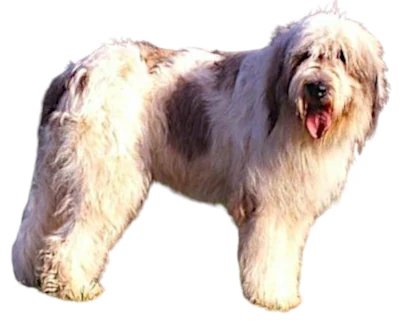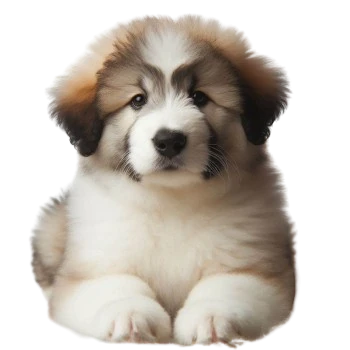
The Romanian Mioritic Shepherd Dog is a breed of shepherd dog originating from Romania. This robust dog is primarily used for guarding and herding livestock in the mountainous regions and valleys of Romania. It is valued for its loyalty, courage, and exceptional working skills.
The Romanian Mioritic Shepherd Dog is a large dog with a robust and muscular build. It has a broad head with a slightly pointed muzzle and expressive eyes, usually dark brown in color. Its ears are of medium size, either upright or slightly tilted. The coat is long, dense, and double, with a thick undercoat to protect it from harsh weather conditions. The coat color can vary from white to cream, including various shades of gray. The height at the withers typically ranges from 65 to 80 cm (25 to 31 inches) for males, and from 60 to 75 cm (24 to 30 inches) for females.
The Romanian Mioritic Shepherd Dog generally weighs between 40 and 70 kg (88 to 154 pounds). Males are often larger and heavier than females. This weight and size provide it with great strength and remarkable endurance, suitable for guarding and herding tasks in mountainous environments.
The coat of the Romanian Mioritic Shepherd Dog is long, dense, and double, designed to protect it from harsh weather conditions. Its outer layer is longer and coarser, while the undercoat is thick and insulating. Common coat colors include white, cream, and various shades of gray. Regular grooming is necessary to prevent matting and maintain the coat's quality.
The Romanian Mioritic Shepherd Dog is known for its courageous, loyal, and protective temperament. It is extremely devoted to its owner and its flock, displaying great intelligence and a keen instinct for guarding. This dog is generally reserved with strangers but extremely faithful and affectionate with its family. It requires regular mental and physical stimulation as well as sufficient space to exercise.
The Romanian Mioritic Shepherd Dog is generally a healthy breed with an average lifespan of 10 to 12 years. Like many large breeds, it may be prone to certain health issues such as hip dysplasia and joint disorders. Regular care, a balanced diet, and veterinary check-ups are essential to maintaining its health and well-being.

The Romanian Mioritic Shepherd Puppy is a robust breed known for its strength, endurance, and protective instincts. With its dense, weather-resistant coat, this dog is perfectly suited for outdoor life and pastoral work. It is intelligent, loyal, and very attached to its family. This dog requires early socialization and consistent training to develop its working skills and balanced behavior.
The price of a Romanian Mioritic Shepherd Puppy generally ranges from 700 to 1200 euros, depending on the breeder and lineage. It is advisable to choose a certified breeder to ensure the puppy's health and well-being. Additional costs for vaccinations and spaying/neutering should also be considered when adopting.
The Romanian Mioritic Shepherd Dog is a robust, intelligent, and protective breed, traditionally used for guarding livestock. To train this breed, it is essential to start early and use positive methods, as it responds well to rewards like treats and praise. However, its protective instinct and independence require a firm yet gentle approach to channel its energy and temperament.
Due to its heritage as a livestock guardian, recall and obedience training are crucial aspects of its education. Practice recall exercises in various environments to reinforce obedience. The Romanian Mioritic Shepherd Dog also excels in guarding and protection activities, so incorporate role-playing games or defense exercises to stimulate its natural talents while strengthening your bond.
Socialization is another key point. Expose it to different environments, people, and animals to ensure it becomes a well-balanced and confident dog. Finally, be patient and consistent, as this breed can be stubborn. With proper training, the Romanian Mioritic Shepherd Dog will become a loyal, obedient, and devoted companion.